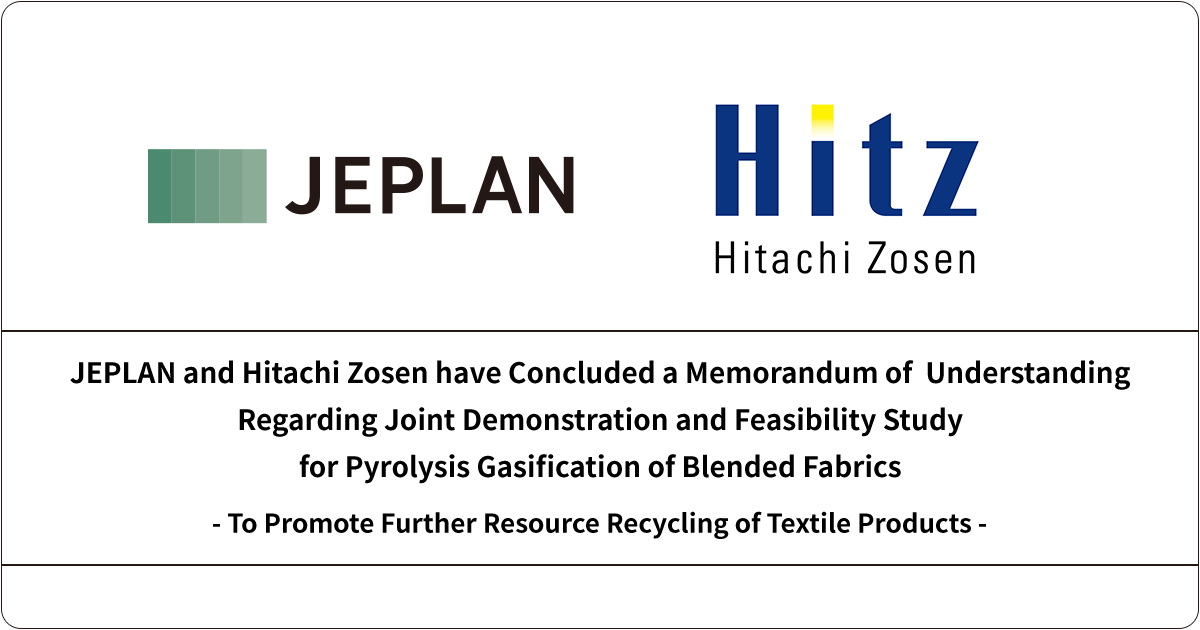JEPLAN, INC.(Kawasaki City, Kanagawa Pref., Representative Director, President, and Chief Executive Officer: Masaki Takao; hereinafter, “JEPLAN”) and Hitachi Zosen Corporation (Osaka City, Osaka Pref., President and Chief Operating Officer:Michi Kuwahara; hereinafter, “Hitachi Zosen”) have concluded a Memorandum of Understanding (hereafter, the “MOU”) regarding a joint demonstration and feasibility study for pyrolysis gasification of textile products. Based on the MOU, the two companies will start a joint demonstration project to promote further resource recycling of textile products.

In Japan, 512,000 tons, or more than 60% of the new domestic supply (819,000 tons) of clothing made from fibers derived primarily from petroleum resources is disposed of by incineration or landfill. Globally, the fiber-to-fiber recycling rate for textile products remains low at less than 1%*1. Clothing is often produced with blended fibers that combine different materials such as polyester, cotton, and wool to improve functionality. While technology exists to recycle clothing made of single materials, there are many technical challenges to recycling clothing made of blended fabrics because each material must be recycled in a different way. It is a factor that makes it difficult to recycle.
Pyrolysis gasification is a technology that converts waste materials such as textiles into useful gases by heating them to high temperatures in an oxygen-free environment. The carbon in the waste is converted to combustible gas, thus reducing carbon dioxide (CO₂) emissions compared to treatment by incineration. With the MOU, we aim to convert blended fabrics into useful gas by pyrolysis gasification, and recycle the resulting gas into polyester, a raw material for clothing. This is intended not only to recycle discarded clothing, which would otherwise be incinerated or landfilled, into a useful resource, but also to contribute to the reduction of CO₂ emissions.
Hitachi Zosen has been working on pyrolysis gasification technology as a next-generation treatment technology for municipal solid waste and has constructed a demonstration plant at the Maishima Incineration Plant of Osaka Waste Management Authority (Osaka City) under a project commissioned by the Ministry of the Environment. Then, from April 2022 to October 2023, Hitachi Zosen have conducted a demonstration operation of pyrolysis gasification of municipal solid waste. JEPLAN works with various apparel brands to collect and recycle clothing in stores and business uniforms, such as work clothes and office uniforms. Of the collected clothing, polyester fibers are chemically decomposed and impurities are removed using JEPLAN’s proprietary PET chemical recycling technology to regenerate them to a quality equivalent as petroleum-derived fibers. By selling the recycled polyester resin and developing apparel brands that use recycled materials, we are working to recycle used clothing resources.
Based on Hitachi Zosen's pyrolysis gasification technology, JEPLAN's clothes collection scheme and know-how on their manufacturing and sales, and the knowledge gained from the joint demonstration in 2023*2, we will consider making textile products from blended fabrics as a raw material for recycled polyester by pyrolyzing and gasifying blended fabrics and converting the resulting gas into chemical raw materials. We aim to further recycle used clothing resources while being widely involved in the supply chain of the apparel industry. JEPLAN Group will continue working towards its Mission to “We circulate our world” collaborating with partners within and outside Japan to unite as a Group and lead the way towards a circular economy.
※1 Source:New Energy and Industrial Technology Development Organization (NEDO) Technology Strategy Center Foresight
Vol.116:https://www.nedo.go.jp/content/100967090.pdf (Japanese)
※2 Reference:https://www.jeplan.co.jp/en/2023/09/22/13404/
■ The MOU outline
- Title:Memorandum of Understanding Regarding Joint Demonstration and Feasibility Study for
Pyrolysis Gasification of Blended Fabrics in Fiber-to-Fiber - Signatory:Hitachi Zosen Corporation and JEPLAN, INC.
- Signing date:June 27, 2024
- Schedule:The term of the MOU is set until March 2025 to promote the study
■ Hitachi Zosen Corporation(https://www.hitachizosen.co.jp/english)
President:Michi Kuwahara, President & Chief Operating Officer
Foundation:April 1881
Business:Engineering, procurement and construction of Waste to Energy plants, desalination plants, water and sewage treatment plants, marine diesel engines, press machines, process equipment, precision machinery, bridges, hydraulic gates and equipment for use in disaster prevention/mitigation, etc.
While shipbuilding was our founding business, we started "environmental business" such as Waste-to-Energy (WtE) facilities in the 1960's. In 2002, we spun off our shipbuilding business and made a major shift to environmental business. In the field of WtE plants, we delivered Japan's first full-scale facility to Osaka City in 1965, and since then we have become the leading company with more than 1,500 installations in Japan, Asia, Europe, and other parts of the world. In recent years, in order to reduce CO₂ emissions, we have been working on the development of technologies other than incineration and toward "post-combustion". In October 2024, we will change the company name to “Kanadevia Corporation”.
Press Release (PDF)
